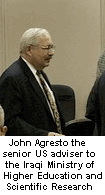 Iraqi
Universities Low Priority for Nation's Resurrection. (June 22, 2004)
Iraqi
Universities Low Priority for Nation's Resurrection. (June 22, 2004)
|
News & Views item - June 2004 |
![]()

While The New York Times was highlighting the condemnation by US Nobel Laureates of US President George W Bush for his science policy The Washington Post ran an extensive article by Rajiv Chandrasekaran, "An Educator Learns the Hard Way", in which he describes the fate of Iraq's universities.
The educator referred to is John Agresto the senior adviser chosen by the US administration to oversee the Iraqi Ministry of Higher Education and Scientific Research beginning in September last year. John Agresto, a former president of St. John's College, in Santa Fe, N.M. replaced Andrew P.N. Erdmann, a former member of the U.S. State Department's Policy Planning Staff.
On taking on the job Agresto said, "The Iraqis had one of the finest systems of higher education years ago, and it's simply a question of helping them rebuild what they once had. The physical situation of the universities in some cases is fine, I've heard, and in other cases is disastrous, so they need help rebuilding their libraries down to even basics such as getting paper, chairs, and pens -- and so many computers have been lost."
Now almost ten months have passed since Agresto landed in
Bagdad and yesterday he told the Post, "
The upshot? The $US35 million requested by Bush morphed in $US8 million and, "At [a] conference in October, donor nations pledged in excess of $400 million for Iraqi universities. But none of that money has arrived in Baghdad. 'There was a lot of talk,' Agresto said, 'but little follow-through.'"